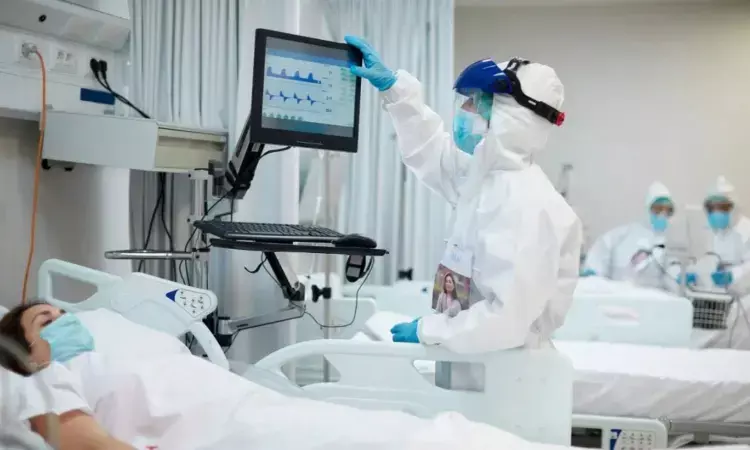- Home
- Medical news & Guidelines
- Anesthesiology
- Cardiology and CTVS
- Critical Care
- Dentistry
- Dermatology
- Diabetes and Endocrinology
- ENT
- Gastroenterology
- Medicine
- Nephrology
- Neurology
- Obstretics-Gynaecology
- Oncology
- Ophthalmology
- Orthopaedics
- Pediatrics-Neonatology
- Psychiatry
- Pulmonology
- Radiology
- Surgery
- Urology
- Laboratory Medicine
- Diet
- Nursing
- Paramedical
- Physiotherapy
- Health news
- Fact Check
- Bone Health Fact Check
- Brain Health Fact Check
- Cancer Related Fact Check
- Child Care Fact Check
- Dental and oral health fact check
- Diabetes and metabolic health fact check
- Diet and Nutrition Fact Check
- Eye and ENT Care Fact Check
- Fitness fact check
- Gut health fact check
- Heart health fact check
- Kidney health fact check
- Medical education fact check
- Men's health fact check
- Respiratory fact check
- Skin and hair care fact check
- Vaccine and Immunization fact check
- Women's health fact check
- AYUSH
- State News
- Andaman and Nicobar Islands
- Andhra Pradesh
- Arunachal Pradesh
- Assam
- Bihar
- Chandigarh
- Chattisgarh
- Dadra and Nagar Haveli
- Daman and Diu
- Delhi
- Goa
- Gujarat
- Haryana
- Himachal Pradesh
- Jammu & Kashmir
- Jharkhand
- Karnataka
- Kerala
- Ladakh
- Lakshadweep
- Madhya Pradesh
- Maharashtra
- Manipur
- Meghalaya
- Mizoram
- Nagaland
- Odisha
- Puducherry
- Punjab
- Rajasthan
- Sikkim
- Tamil Nadu
- Telangana
- Tripura
- Uttar Pradesh
- Uttrakhand
- West Bengal
- Medical Education
- Industry
Ticagrelor addition to heparin not tied to improved outcomes in COVID-19: JAMA

USA: The use of a P2Y12 inhibitor in addition to a therapeutic dose of heparin versus heparin alone does not improve survival free of organ support in non–critically ill hospitalized patients with COVID-19, reveals a recent study. Thus, the findings published in the Journal of the American Medical Association (JAMA), do not support P2Y12 inhibitor addition in this high-risk cohort.
COVID-19 results in significant morbidity and mortality. The majority of the patients affected by the SARS-CoV-2 virus are not critically ill and do not need intensive care–level support. Data from a multiplatform randomized clinical trial showed that a therapeutic dose of heparin increased the number of days alive and free of organ support in non–critically ill patients with COVID-19. In the trial, 24% of the patients (247/1048) died or received intensive care–level support. Also, platelets represent a potential therapeutic target for improved clinical outcomes in COVID-19 patients. This highlights the need for additional therapies in this high-risk cohort.
Against the above background, Jeffrey S. Berger, NYU Grossman School of Medicine, New York, New York, and colleagues aimed to evaluate the benefits and risks of adding a P2Y12 inhibitor to anticoagulant therapy among non–critically ill patients hospitalized for COVID-19 in an open-label, bayesian, adaptive randomized clinical trial.
The trial included 562 non–critically ill patients hospitalized for COVID-19 across 60 hospitals in Brazil, Italy, Spain, and the US between February 2021 and June 2021. The date of the final 90-day follow-up was September 15, 2021.
Patients were randomized in a ratio of 1:1 to receive a therapeutic dose of heparin plus a P2Y12 inhibitor (n = 293) or a therapeutic dose of heparin only (usual care) (n = 269) for 14 days or until hospital discharge, whichever was sooner. Ticagrelor was the preferred P2Y12 inhibitor.
The composite primary outcome was organ support–free days evaluated on an ordinal scale that combined in-hospital death (assigned a value of −1) and, for those who survived to hospital discharge, the number of days free of respiratory or cardiovascular organ support up to day 21 of the index hospitalization (range, −1 to 21 days; higher scores indicate less organ support and better outcomes).
Key findings include:
- Enrollment of non–critically ill patients was discontinued when the prespecified criterion for futility was met.
- All 562 patients who were randomized (mean age, 52.7 years; 41.5% women) completed the trial and 87% received a therapeutic dose of heparin by the end of study day 1.
- In the P2Y12 inhibitor group, ticagrelor was used in 63% of patients and clopidogrel in 37%.
- The median number of organ support–free days was 21 days among patients in the P2Y12 inhibitor group and was 21 days in the usual care group (adjusted odds ratio, 0.83; posterior probability of futility [defined as an odds ratio <1.2], 96%).
- Major bleeding occurred in 6 patients (2.0%) in the P2Y12 inhibitor group and in 2 patients (0.7%) in the usual care group (adjusted odds ratio, 3.31).
"The use of a P2Y12 inhibitor in addition to a therapeutic dose of heparin versus therapeutic dose of heparin only, among non–critically ill patients hospitalized for COVID-19 did not result in an increased odds of improvement in organ support–free days within 21 days during hospitalization.
Reference:
Berger JS, Kornblith LZ, Gong MN, et al. Effect of P2Y12 Inhibitors on Survival Free of Organ Support Among Non–Critically Ill Hospitalized Patients With COVID-19: A Randomized Clinical Trial. JAMA. 2022;327(3):227–236. doi:10.1001/jama.2021.23605
Dr Kamal Kant Kohli-MBBS, DTCD- a chest specialist with more than 30 years of practice and a flair for writing clinical articles, Dr Kamal Kant Kohli joined Medical Dialogues as a Chief Editor of Medical News. Besides writing articles, as an editor, he proofreads and verifies all the medical content published on Medical Dialogues including those coming from journals, studies,medical conferences,guidelines etc. Email: drkohli@medicaldialogues.in. Contact no. 011-43720751


